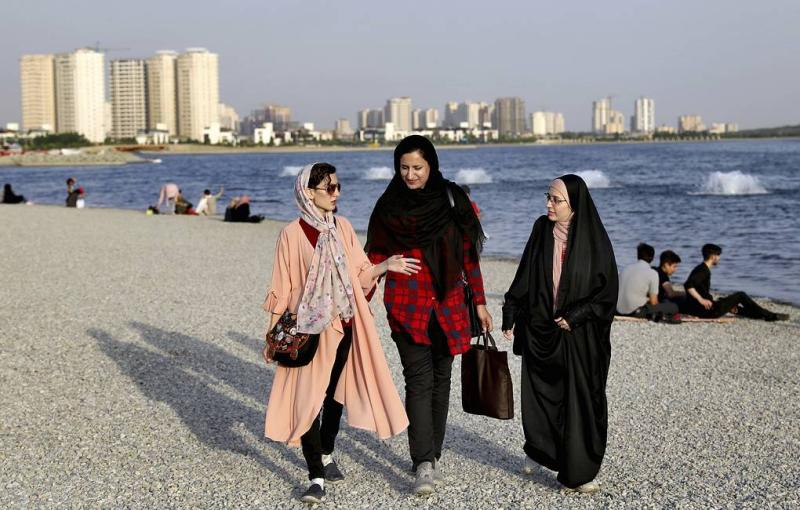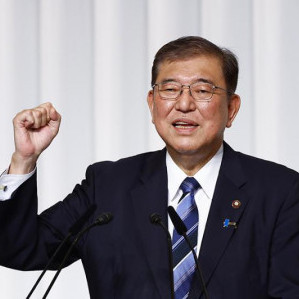
© AP Photo/Ebrahim Noroozi/TASS
Top stories from the Russian press on Monday, December 5th, prepared by TASS
The consequences of the European Union’s move to cap the price of Russian oil remain unclear as Moscow refuses to accept it, the United States and its allies are searching for a way out of the Ukrainian crisis and the Iranian authorities made a concession to protesters by shutting down the morality police. These stories topped Monday’s newspaper headlines across Russia.
Izvestia: What reverberations the EU’s Russian oil price cap may generate
Russia will not supply oil to European Union countries even if a price cap reaches $200 per barrel, a member of the State Duma’s (the lower house of parliament) Energy Committee told Izvestia. On December 2, EU members agreed to cap the price of Russian oil at $60 per barrel.
The EU deliberately opted for a price cap that would benefit Russia, Deputy Director General of the National Energy Institute Alexander Frolov noted. "Prices need to remain at a level where we will lose money on each barrel of oil but the activities of European sea carriers will contribute to an increase in oil production in our country, which will eventually lead to a rise in exports," the expert explained.
"The goal of the price cap is not to punish Russia but to keep oil exports attractive for the country and make sure that the West has the opportunity to bypass its own sanctions to actually get Russian commodities," Associate Professor at the Russian Government’s Financial University Valery Andrianov pointed out. According to him, the price cap may even push Russian oil prices up in the Asia-Pacific region because there would be many willing to purchase Russian oil, including Western companies and traders who will seek to make money on that, "buying oil at the capped price and reselling it more expensively."
Meanwhile, OPEC+ countries have decided to keep the oil output cut deal unchanged. The reason is that the consequences of the EU’s embargo and price cap on Russian oil are unclear. The OPEC+ decision looks optimistic for Russia, Frolov said. In his view, the group’s member states "believe that our country is capable of redirecting most of its supplies to alternative markets without Western sea carriers and it also seems that OPEC+ does not see any preconditions for an oil production collapse in Russia as a result of the embargo imposed by Europe and the United States," the expert added.
Kommersant: US, allies looking for way out of Ukrainian crisis
The West’s future strategy in the Ukrainian conflict will be the main topic of United States Deputy Secretary of State Wendy Sherman’s tour of Europe, which is about to begin. The need for brainstorming arose from the lack of a clear understanding of what kind of solutions to the crisis may suit Washington and its allies. While still showing a tough approach, the US-led Western axis is sending signals to Moscow about the need to agree on a compromise, Kommersant notes.
Things aren’t unequivocally clear in terms of implementing the West’s Ukraine policy despite the display of determination to sustain its support of Kiev, which was confirmed last week during the Washington talks between US President Joe Biden and his French counterpart Emmanuel Macron. During her trip, Sherman will need to start rebuilding the US-led West’s Ukraine strategy based on the actual situation that has developed both in the zone of the armed conflict between Moscow and Kiev and in terms of the pressure of sanctions on Russia.
More proof of the West’s search for a way out of the Ukrainian crisis is Biden’s recent statement that he is prepared to speak with Russian President Vladimir Putin about ending military activities in Ukraine though he does not have immediate plans for contact as Russia first needs to make certain decisions.
Washington’s closest European allies, Paris and Berlin, are also showing interest in contacting Moscow. On Friday, German Chancellor Olaf Scholz initiated a phone call with Putin, the first one since September 13. After his visit to the US, French President Emmanuel Macron also announced plans to continue talks with the Russian leader.
One of the reasons that are pushing the US towards searching for a compromise may be the looming awareness that the Russian economy still hasn’t collapsed from the barrage of sanctions, which is what the White House initially expected, and Washington turned out to lack economic tools to make Moscow end its military operation in Ukraine.
Media: Iranian regime makes concession to protesters
The Guidance Patrol of Iran’s Law Enforcement Command will be shut down, the country’s prosecution authorities announced. This may be the first step leading to an even more important decision on lifting the mandatory wearing of hijab. Meanwhile, Tehran’s foreign policy, influenced by the Islamic Revolutionary Guard Corps, remains inconvenient for the US, Nezavisimaya Gazeta writes.
The current protests in Iran may be considered unprecedented in scale since 1979, Senior Researcher at the Russian Academy of Sciences’ Institute of Oriental Studies Vladimir Sazhin noted. "The unrest is dangerous for the regime but it will most likely hold up. It has tools to suppress dissent, namely an extensive security system, which includes the IRGC’s Basij militia that played a role in suppressing protests after the 2009 presidential election. However, the authorities refrain from using radical methods for the time being," the expert added.
"It’s not clear at this point whether the shutdown of the morality police is another symbolic gesture or the onset of systemic reform. However, it’s obvious that the time for symbolic steps has passed and only serious reforms can reassure the population," Iran expert Nikita Smagin told Kommersant. He pointed out that protests might subside temporarily. "However, if the political elite relaxes, deciding that it’s done a good job and everyone is satisfied with its symbolic steps, then the respite will not last long. There will be more incidents and more protests," the analyst explained.
The change announced by the prosecution cannot be described as a revolutionary one because other government bodies also have supervisory functions, but it may mark the start of more changes. Whether they will take place is the main question of Iran’s domestic political life.
In the meantime, another landmark event took place in the country as the construction of Iran’s second nuclear power plant was announced (Iran currently has just one nuclear power plant in Bushehr, built with Russia’s assistance). However, the Americans are now less concerned about Iran’s nuclear energy development than they used to be. There is little chance for the nuclear deal to be resumed in the near future, while Washington seeks to prevent Iranian weapons supplies to Russia. The question is how the US will put pressure on Iran in a situation where the toughest sanctions have already been imposed on the country.
Izvestia: UN joins efforts to unblock Russian fertilizer exports
The United Nations is in talks with Riga at Moscow’s request in order to unblock Russian fertilizers held at Latvian ports, Russian First Deputy Representative to the UN Dmitry Polyansky told Izvestia. According to the Russian Foreign Ministry, Latvia has over 80% of the fertilizers blocked at foreign ports.
Vessels loaded with fertilizers were detained at some European ports after fertilizer producers had been sanctioned. Russia decided to hand the fertilizers over to the countries in need, primarily African ones, free of charge. "The UN is now actively raising the issue based on our memorandum," Polyansky emphasized. "It’s about the second part of the grain package deal that was made in Istanbul earlier this year," he added.
According to Valdai Discussion Club Program Director Ivan Timofeev, the European Union is unlikely to introduce additional exceptions for fertilizer exports because everything was already clarified in the previous packages of sanctions. However, "there is occasional overzealousness," the expert noted.
A thing to note is that Paris has also stepped up efforts to resolve the issue of Russian fertilizer supplies. On November 16, French President Emmanuel Macron announced the creation of a corridor to ensure supplies to Africa, which will be launched in the coming weeks. Turkish political scientist Kerim Has believes that Macron wants to seize the initiative from Turkish President Recep Tayyip Erdogan who was the chief "founding father" of the grain deal signed in Istanbul in July.
As for Russia, it does not need France as a mediator to export its fertilizers, Moscow just wants the Europeans to unblock Russian fertilizers at European ports, the expert explained. In his opinion, the Baltic states will eventually have to agree to the conditions offered by the UN and Russia, and unblock the fertilizer exports.
Vedomosti: EU about to engage in subsidy race with US
The European Commission will review its medium-term budget to create a mechanism to protect European industries, a commission official told Vedomosti. In particular, work on the European Sovereignty Fund will be stepped up, which comes in response to a US subsidy program that makes the United States far more attractive for businesses than Europe.
The matter is about the United States Inflation Reduction Act (IRA), which provides for government subsidies for the establishment of environmentally friendly production, as well as for tax cuts. Localizing production in the US is the key condition for receiving support. Germany’s Volkswagen has already taken advantage of the program, launching the production of electric vehicles at its facility in the US state of Tennessee in late October. The Danish jewelry manufacturer Pandora and Germany’s BASF chemical company also told the newspaper about their plans to expand production in the US.
The EU cannot afford to compete with the US in terms of subsidy amounts, said Irina Ipatova, a leading expert at the Center for Macroeconomic Analysis and Short-Term Forecasting. EU countries don’t have real leverage over the US as far as talks go so they are preparing to take tit-for-tat measures to protect their economies, said Yevgeny Tonevitsky, an advisor to the president of the Center for Strategic Research. No matter what mechanism they end up with, it will in any case lead to the deglobalization of the world economy and reduce the overall rate of economic growth, the expert pointed out. It will probably motivate Europe to deepen economic cooperation with China, he added.
Trade wars between Europe and the US are nothing new, Associate Professor with the Russian Presidential Academy of National Economy and Public Administration Sergey Khestanov stressed. For quite a long time, the Americans have been criticizing European programs, including those aimed at supporting agricultural producers. Leading Researcher at the Russian Academy of Sciences’ Institute of World Economy and International Relations Alexey Portansky does not rule out that the IRA issue marks another phase in the standoff, which may result in a subsidy race.









